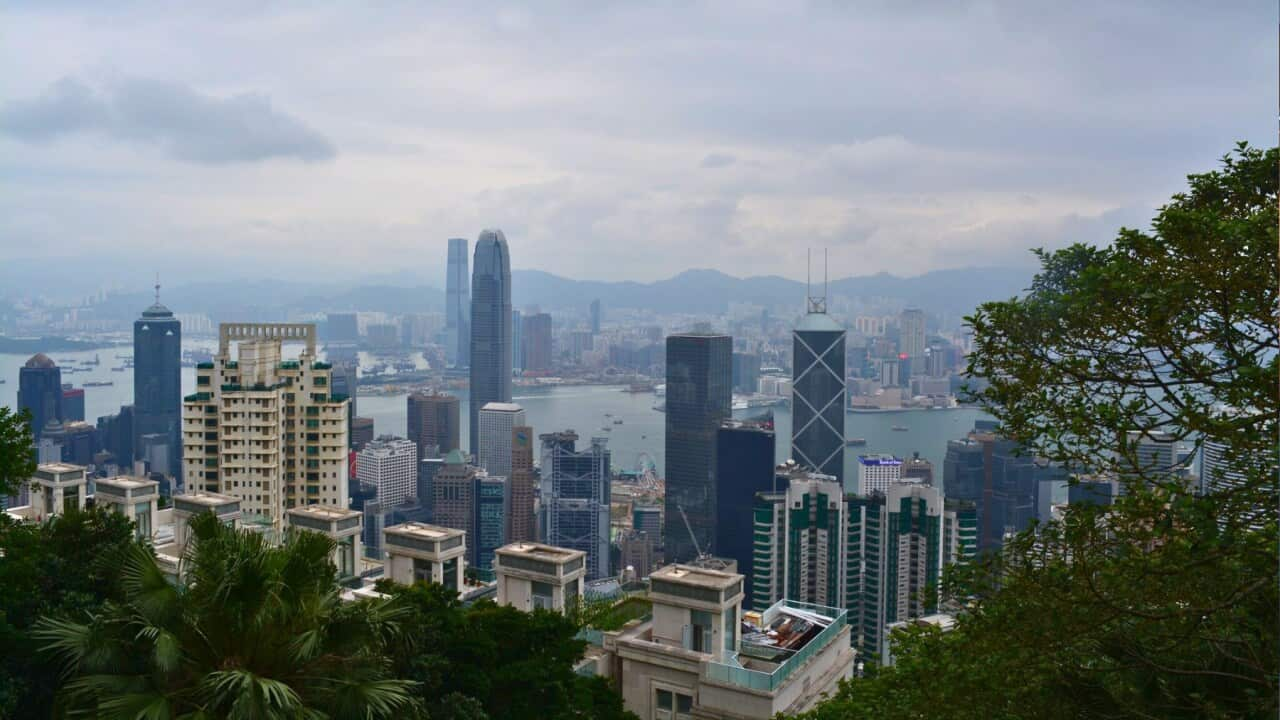TRANSCRIPT
Ted Hui is one of Hong Kong's most wanted.
He's a former Hong Kong legislator, involved in mass anti-government protests in 2019, which were sparked by a plan to allow extradition from the special administrative region to mainland China.
It was a move critics feared would undermine Hong Kong's judicial independence and endanger dissidents.
That bill was withdrawn, but a Beijing-imposed national security law was enacted to crack down on all forms of dissent, forcing Ted Hui to flee to Australia, while on bail for protest-related criminal charges.
"There is no freedom in Hong Kong. There's no freedom of assembly, and when people criticise the government, the government will lock us up. All the freedom and democracy that we once enjoyed in the past is now collapsed"
Hui now practices law in Australia and is critical of the Australian judges sitting on Hong Kong's court of final appeal, in what he calls an increasingly hostile environment.
Hong Kong authorities implemented another security law, Article 23 earlier this year.
"It's supposed to be a system that allows recognitions that the Hong Kong common law system will be in sync with Western Democracies... but at the same time they are lending their own reputations and integrity of their respective jurisdictions to the Hong Kong's already eroded and authoritarian regime".
According to the Judiciary of the Hong Kong Special Administrative Region, overseas non-permanent judges have made significant contributions to the development of Hong Kong's judicial system; being "...top common law experts specialising in different legal fields. They have rich judicial experience and are known for their noble, professional status and reputation."
Currently there are 7 overseas non-permanent common law judges, three British and four Australians, sitting on Hong Kong's top court.
Former High Court Chief Justice Robert French defends his role on the Court of Final Appeal, telling SBS they are “good, decent people and high quality judges who are indispensable to the Rule of Law in Hong Kong. A mass resignation would be damaging to the Rule of Law and contribute to the isolation of Hong Kong from international legal thinking.”
In the last year, there have been a several resignations from the top court.
Former British Supreme Court Justice Lord Sumption left in June, writing in the Financial Times:
"Hong Kong, once a vibrant and politically diverse community, is slowly becoming a totalitarian state. The rule of law is profoundly compromised in any area about which the government feels strongly."
Alyssa Fong is the public affairs advocacy manager for the Committee for Freedom in Hong Kong Foundation
"What is it for these judges that they feel the need to stay, ... and I know that Australian judges have before said to imply that its for the money, which is $78,000 Australian dollars per sitting that they get, would be insulting".
While the Hong Kong Court of Final Appeal hears appeals from a range of civil and criminal matters -
Sentences upheld by the court include that of a teenager for shining a flashlight at a police officer during a protest as well as a conviction of Jimmy Lai, the founder of Hong Kong's largest pro-democracy newspaper.
This is Caoilfhionn Gallagher, a barrister at Doughty Street Chambers who leads Jimmy Lai's international legal team.
"While Jimmy Lai is going through this process, we simultaneously have a fig leaf of due process being given to the system in Hong Kong. In my view this is a form of judicial washing and presents Hong Kong as if it is rule of law compliant instead of recognising it for what it’s become.”
Retired Australian judges serve in Hong Kong in a private capacity and are offered briefings by the Department of Foreign Affairs and trade on Australia's approach to Hong Kong’s national security legislation.
According to a departmental spokesperson the Australian government continues to call for the repeal of the National Security Law in Hong Kong and "is deeply concerned by the systemic erosion of Hong Kong's rights, freedoms, autonomy and democratic processes…”
This is Senator David Fawcett, the Deputy Chair of the Parliamentary Joint Standing Committee on Foreign Affairs, Defence and Trade.
"The fact that they may not sit on a national security law case doesn’t resolve the fact that that national security law is cracking down on basic human rights … and so their presence there and ruling on other cases that may intersect essentially implements the national security law."
According to estimates, there are more than 1800 political prisoners in Hong Kong.
Produced in collaboration with SBS Cantonese













